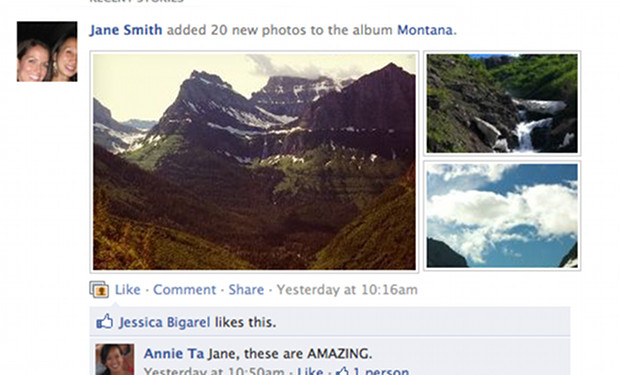Is a Facebook “Like” Entitled to Constitutional Protection?
The Facebook “like” feature allows users to click a thumbs up icon attached to posts, pictures, links, and pages. By clicking this “like” button, users can “like” pages of companies, political candidates and even candidates in a cutest baby contest. But is a Facebook “like” an expression of liking or supporting something?
On April 24, in Bland v. Roberts, Judge Raymond Jackson of the United States District Court for the Eastern District of Virginia ruled “merely ‘liking’ a Facebook page is insufficient speech to merit constitutional protection.”
In Bland v. Roberts, six plaintiffs claimed Hampton Sherriff B.J. Roberts fired them for supporting his opponent Jim Adams in the 2009 election. Jim Adams was a former Lieutenant Colonel in the Sheriff’s Department and knew each of the plaintiffs.
Some plaintiffs allegedly took part in protected activities including placing a bumper sticker on one of their cars and attending a cookout sponsored by Adams—but there was no evidence Sheriff Roberts was aware of these activities. Roberts admitted he was aware of Plaintiffs McCoy and Carter having “liked” Adams’ Facebook campaign page, and because the court concluded liking a Facebook page is “insufficient speech to merit constitutional protection,” the court said Roberts’ awareness of the Facebook activity was not relevant.
Plaintiffs McCoy and Carter were sworn deputies and alleged their terminations violated their First Amendment right to freedom of speech. To prove an adverse employment action violates a plaintiff’s right to freedom of speech, a plaintiff must satisfy the three-prong test set out in McVey v. Stacy. The first prong in this test requires the court to determine whether the public employee was speaking as a citizen upon a matter of public concern or as an employee about a personal matter of personal interest.
The court in Bland v. Roberts only addressed the initial part of the test in determining, “The first prong of the McVey test necessarily requires that speech exist before an evaluation of the remaining prongs can occur. Plaintiffs Carter, McCoy, and Woodward [the only plaintiffs who asserted First Amendment retaliation claims] have not sufficiently alleged that they engaged in expressive speech.” The court ruled those claims failed as a matter of law, despite attempts by McCoy and Roberts to show statements of support on Facebook.
Previous First Amendment decisions involved actual statements, while the court emphasized no statements existed in this case. McCoy claimed he posted a statement, which he later deleted, and Carter attached a statement he allegedly made in support of Adams. However, the court ruled the only evidence of Carter’s activity was his having “liked” Adams’ page, as the court would “not attempt to infer the actual content of Carter’s posts from one click of a button on Adams’ Facebook page.”
Critics of the decision argue the point of clicking “like” on Facebook is to convey a message to others. Eugene Volokh, a law professor at the University of California at Los Angeles, argues the holding is wrong as he wrote on his blog, “I would treat ‘liking’ as a verbal expression – though it takes just one mouse-click, it publishes to the world text that says that you like something. But even if it’s just treated as symbolic expression, it is still constitutionally protected, as such cases in Texas v. Johnson (1989) (the flag-burning case) show.”
Sarah Ludington, an Assistant Professor at Campbell University School of Law, thinks the judge employed a narrow definition of speech while the Supreme Court has defined speech expansively. “I don’t see how ‘liking’ can be meaningfully distinguished from giving money to a candidate, which is highly protected political speech,” Ludington said.
Supporters of the holding argue a Facebook “like” does not convey a clear message as users may “like” a page for a multitude of reasons, for example, users may “like” a company page to be entered into a contest. Ludington noted, “The test does not require the speech to be unambiguous. When someone is wearing a black armband, you don’t know if the person is in mourning, protesting, trying to be ‘goth,’ or what they are trying to convey—but it’s still protected speech.”
Bland signals that social and digital media speech issues are increasing as social media has become a more widely used mode of expression. Perhaps the Court in Bland declined to “infer” what a Facebook “like” might constitute out of an inadvertent misunderstanding, as a “like” triggers multiple events on Facebook (including notifying others of the like, becoming visible to others who have “liked” the same page, and having your activity pop up on a news feed).
This misunderstanding of social media features is present in the still-pending case Fraley v. Facebook in which a class of users are suing Facebook for using their “likes” for its advertising program. The plaintiffs gave a multitude of reasons why they clicked “like” on particular pages and claim they did not know “their actions would be interpreted and publicized by Facebook as an endorsement of those advertisers, products, services, or brands.”
As social media becomes even more imbedded in society, with increasing popularity and updates, the courts will be called upon to interpret and rule on these issues.






